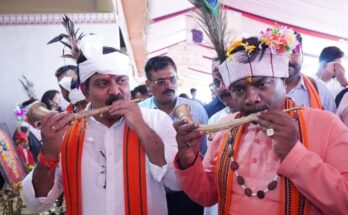With the implementation of GST, the number of registered businessmen increased by more than 50 lakhs
Various taxes have been included in GST
Raipur, 26 July 2024
Finance and Commercial Tax Minister Shri OP Choudhary presented the Chhattisgarh Goods and Services Tax Amendment Bill 2024 in the Assembly today. After detailed discussion in the House, the Amendment Bill 2024 was passed unanimously. The Finance Minister said that with the implementation of GST, the number of registered businessmen has increased by more than 50 lakh. Various taxes have been included in GST. The Chhattisgarh Goods and Services Tax Amendment Bill 2024 was approved in the cabinet meeting held on 19 July 2024 under the chairmanship of Chief Minister Shri Vishnu Dev Sai.
On the basis of the recommendation of the GST Council, the necessary amendment has been made by the Central Government. Following which, the State Government has also made amendments, under which the head office will distribute the input tax credit to its branch offices through the input service distributor and a provision of a fine of Rs 1 lakh has been made for tobacco manufacturers not registering their machines.
Mr. Chaudhary said that from time to time, the GST Council decides to amend the GST Act as per the need so that business can be facilitated and increase in tax revenue can be ensured.
In this context, the GST Council had decided to make certain amendments in the Act to rationalize the provision of input tax credit in respect of input service distributors and for registration of machines used in the manufacture of pan masala, gutkha, etc. In view of the decision taken by the GST Council, the Central Goods and Services Tax (Amendment) Act, 2024 has been notified from 15 February 2024. Therefore, it is necessary to amend the Chhattisgarh Goods and Services Tax Act 2017 accordingly.
The said amendment inter alia reads as follows:-
In order to bring uniformity in the process adopted by the Input Service Distributor for distribution of input tax credit across the country, amendments are being made in the definition section. Along with this, reverse charge levy is also being included under it. Accordingly, necessary amendments have been made in the relevant section to prescribe the method of distribution of input tax in the above cases.
Mr. Chaudhary informed that on the recommendations of the GST Council, due to the highest revenue leakage in the tobacco product manufacturing sector, the compliance burden has been increased for them, under which registration of every machine has been made mandatory. There is a provision to impose a fine of Rs. 1 lakh for each machine if such manufacturers do not get their machines registered.
Commercial Tax Minister Shri Chaudhary said that GST is one of the most important, historic and unprecedented economic reforms after independence, which includes indirect taxes applicable in the Centre and the states. These taxes include 17 types of taxes like Central Excise Tax, Service Tax, Central Surcharge and Cess, VAT, Entry Tax, Central Sales Tax, Luxury Tax, Entertainment Tax etc. It is the result of the efficient leadership and work of Prime Minister Shri Narendra Modi that due to his farsightedness, the concept of one nation, one tax and one market could be realized by implementing GST.
Finance Minister Shri Chaudhary said that Goods and Services Tax (GST) is a comprehensive indirect tax levied on the supply of goods and services in India. It was introduced on 1st July 2017 to replace multiple taxes and create a single integrated tax system. GST has created a new tradition of cooperative federalism in the country, the best example of which is the GST Council. The GST Council consists of the Union Finance Minister as the Chairman and the Finance Ministers of all the States as its members. In the GST Council, the Centre and the States take collective decisions by mutual consent. With the implementation of GST, the tax system has become simpler and more manageable. Before the implementation of GST, Central Excise Duty was levied on products and VAT was levied on this tax in the State. Thus, tax was levied on tax and the traders of the State did not get credit for Central taxes. Thus, ultimately the cost of goods increased. After the implementation of GST, such cascading effect has ended and seamless flow of input tax credit in the supply chain has been ensured, thereby reducing the overall tax burden on goods and services. The cost of goods and services has come down, boosting consumption, improving economic growth and benefiting consumers.
Mr. Chaudhary said that having an online system for GST registration, return filing and payment has simplified compliance and brought transparency. Now small traders can file returns on their own. Under the GST system, inter-state check posts of different states have been eliminated, which has streamlined the logistics and distribution sector, resulting in reduced cost and time of movement of goods. GST has increased the tax base by bringing many informal businesses under the tax net and ensuring more revenue for the government. Also, now the states have the right to tax services.
Commercial Tax Minister Shri Chaudhary said that under GST, composition facility has been provided to encourage micro and small industries, under which businessmen having turnover up to Rs. 1.5 crore have to deposit a very small part of their turnover like 2% as tax and the compliance burden for them like filing returns and tax payment system has been made simple and easy. Also, they are not required to maintain different types of accounts.
The number of registered businessmen before the implementation of GST was about 1.28 lakh, which has currently increased to about 1.80 lakh. In neighboring states like Jharkhand and Orissa, the number of registered businessmen is 2.05 lakh and 3.38 lakh respectively. Today, most of the problems related to registration in the department have been resolved. Where at the beginning of the year 2024, the process of application for registration used to take an average of 15 days, today it is being completed in only 07 days.
After the implementation of GST, there has been a gradual increase in revenue collection. However, the expected growth has not been achieved in the years 2019-20 and 2020-21 due to the COVID-19 pandemic.
In order to compensate for the possible reduction in revenue growth of various states due to the implementation of GST, the central government has ensured compensation to all the states by making a law as per its promise. A total of Rs 21 thousand 679 crore has been provided as compensation to the state of Chhattisgarh from April 2018 to June 2022.
Mr. Choudhary told the House that due to lack of funds in the Compensation Fund due to reduction in economic activities due to the Covid-19 pandemic, the Central Government took a loan of Rs 2.59 lakh crore to compensate the states in the year 2020-21 and 2021-22, which shows the commitment of the Central Government to compensate the states. Chhattisgarh has received a total amount of Rs 8 thousand 074 crore in the form of back to back loans.
The amount of GST is received directly by the state and 42 percent of the amount of Central GST is received by the Central states in the form of devolution. In this way, states not only get direct benefit from the increase in GST, but also receive money in the form of central share. In Chhattisgarh, the revenue received by the state from the year 2017-18 to 2023-24 and the revenue received from devolution during the same period is Rs. 1.41 lakh crore.
For the convenience of businessmen, a dedicated EODB (Ease of Doing Business) cell has been formed in the Commercial Tax Department, through which the problems of businessmen can be resolved, GST stakeholders (taxpayer professional organization, bar association, chartered accountant association) can be encouraged to increase tax compliance through outreach programs for better coordination. A Joint Commissioner level officer has been made in-charge of the said cell. The cell organizes regular meetings with all stakeholders every month and takes decisions regarding their problems and suggestions. Toll free helpline number has also been started to solve the problems of businessmen. Business Intelligence Unit (BIU) has been formed under the department. Through which action is being taken by detecting data based tax evasion methods using Artificial Intelligence and Machine Learning techniques.
Mr. Choudhary informed that Chhattisgarh State Tax (GST) Department has launched “e-Scrutiny” portal on 11 June 2024, taking a new initiative using information and technology. With this, not only the work being done by the departmental officers can be monitored, but the data obtained from it in analytics will be used in the interest of revenue. Apart from this, the “e-Scrutiny” module will also prove effective in resolving the practical problems faced by the traders of the state like notices being given by more than one officer for the same period etc. All these efforts have benefited small traders and consumers.
MLAs Umesh Patel, Raghavendra Singh participated in the discussion regarding the GST Amendment Bill 2024. After the discussion, the bill was passed unanimously.




